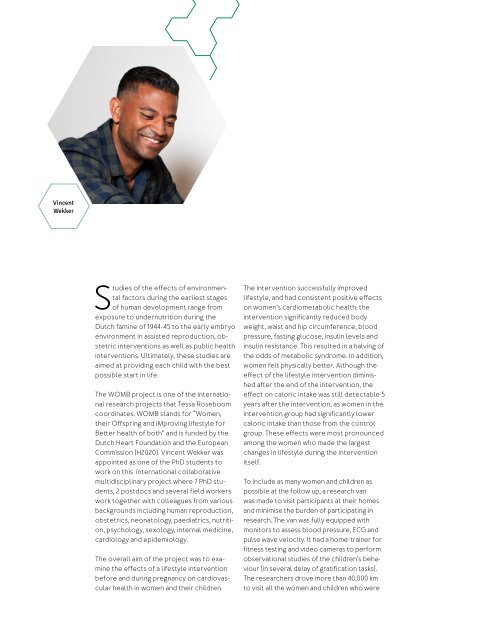AR&D annual report 2018
You also want an ePaper? Increase the reach of your titles
YUMPU automatically turns print PDFs into web optimized ePapers that Google loves.
Vincent<br />
Wekker<br />
Studies of the effects of environmental<br />
factors during the earliest stages<br />
of human development range from<br />
exposure to undernutrition during the<br />
Dutch famine of 1944-45 to the early embryo<br />
environment in assisted reproduction, obstetric<br />
interventions as well as public health<br />
interventions. Ultimately, these studies are<br />
aimed at providing each child with the best<br />
possible start in life.<br />
The WOMB project is one of the international<br />
research projects that Tessa Roseboom<br />
coordinates. WOMB stands for “Women,<br />
their Offspring and iMproving lifestyle for<br />
Better health of both” and is funded by the<br />
Dutch Heart Foundation and the European<br />
Commission (H2020). Vincent Wekker was<br />
appointed as one of the PhD students to<br />
work on this international collaborative<br />
multidisciplinary project where 7 PhD students,<br />
2 postdocs and several field workers<br />
work together with colleagues from various<br />
backgrounds including human reproduction,<br />
obstetrics, neonatology, paediatrics, nutrition,<br />
psychology, sexology, internal medicine,<br />
cardiology and epidemiology.<br />
The overall aim of the project was to examine<br />
the effects of a lifestyle intervention<br />
before and during pregnancy on cardiovascular<br />
health in women and their children.<br />
The intervention successfully improved<br />
lifestyle, and had consistent positive effects<br />
on women’s cardiometabolic health: the<br />
intervention significantly reduced body<br />
weight, waist and hip circumference, blood<br />
pressure, fasting glucose, insulin levels and<br />
insulin resistance. This resulted in a halving of<br />
the odds of metabolic syndrome. In addition,<br />
women felt physically better. Although the<br />
effect of the lifestyle intervention diminished<br />
after the end of the intervention, the<br />
effect on caloric intake was still detectable 5<br />
years after the intervention, as women in the<br />
intervention group had significantly lower<br />
caloric intake than those from the control<br />
group. These effects were most pronounced<br />
among the women who made the largest<br />
changes in lifestyle during the intervention<br />
itself.<br />
To include as many women and children as<br />
possible at the follow up, a research van<br />
was made to visit participants at their homes<br />
and minimise the burden of participating in<br />
research. The van was fully equipped with<br />
monitors to assess blood pressure, ECG and<br />
pulse wave velocity. It had a home-trainer for<br />
fitness testing and video cameras to perform<br />
observational studies of the children’s behaviour<br />
(in several delay of gratification tasks).<br />
The researchers drove more than 40,000 km<br />
to visit all the women and children who were


